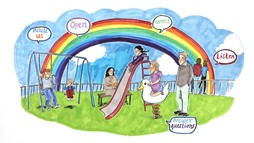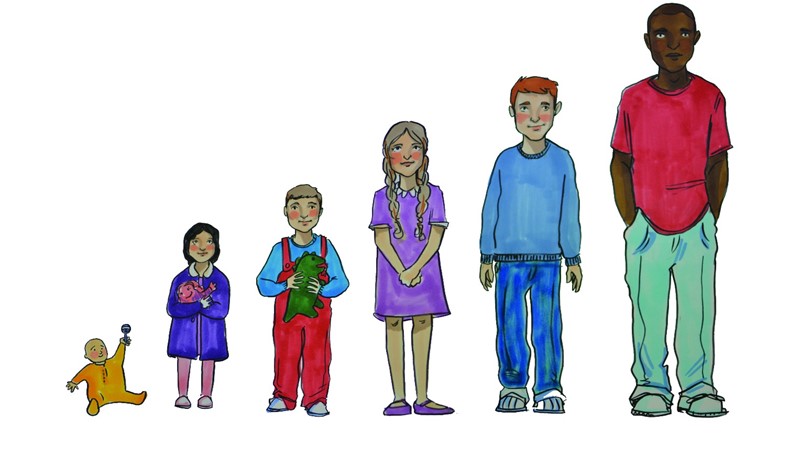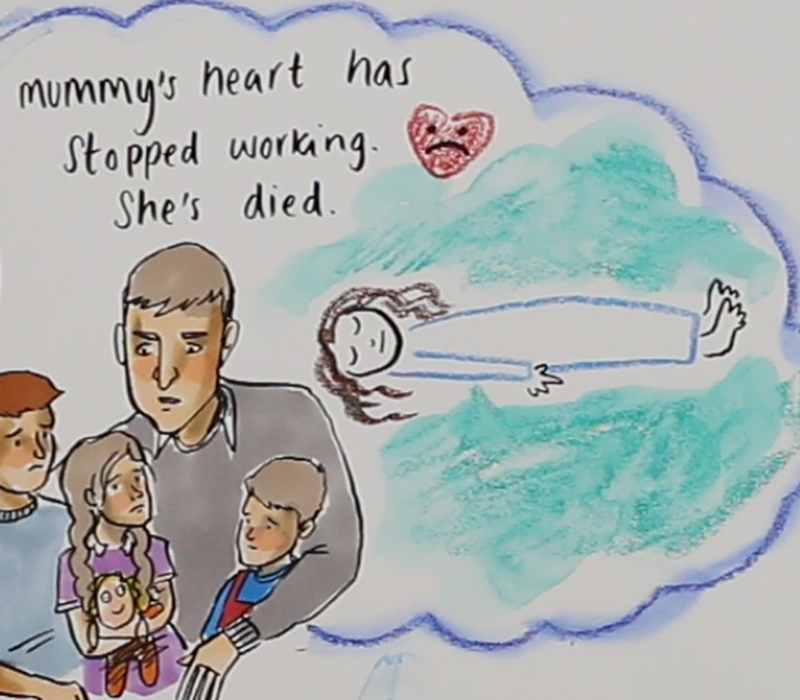Support Around Death e-newsletter
Sign up to receive monthly updates from the website
Caring for, and working with, children who have experienced the death of someone close to them can be daunting and challenging.
There are various organisations which can provide training and education for those who work with children who are bereaved. Search our resources page for more information.
This page offers simple guidance on child development, their understanding of death and dying and practical aspects on interacting with children at this distressing time.
Children experience grief in similar intensities to adults. However, a child’s experience and expression of grief, and their understanding of death will vary depending upon their age and stage of development. They may also fluctuate in and out of their grief.
Please note that the videos on this website deal with issues of death and bereavement and were created for healthcare professionals: caution is advised for viewers who are not healthcare professionals as some may find the themes upsetting.
A transcript of this video can be found here and a downloadable leaflet which accompanies the video can be found here.
Do young children grieve?
Children are never too young to grieve and that the way that they experience events around a death, particularly whether they are included, involved and listened to, can have a great impact on their bereavement journey. Research has demonstrated that early truthful conversations using simple language are very important for children and young people.
What do I need to know about each age group?

Babies and Toddlers 0-2 years
Limited/ no understanding of death and dying
Experience of loss is separation
Will be aware that someone important is missing
May react physically and emotionally to the absence of a significant person - feeding and sleeping routines may be disrupted
There may be increased separation anxiety
Pick up on parental feelings of grief and changes in routine
May regress and start behaving as if a younger child
There may be an increase in tantrums
2-5 years
Death viewed as temporary and reversible – like sleep
Have very concrete/ literal thinking patterns
May think dead people have feelings and bodily functions
May be concerned about causal effects – that their thoughts, feelings, words or wishes led or contributed to the death
5-10 years
Gain appreciation that death is final/ irreversible
Can become fearful as a result of their increased understanding of death and dying
Develop understanding that death has a cause
Most 8 year olds have a fully developed concept of death and understand external causes
10 years - adolescence
There is an understanding of the long term consequences of loss
Personal implications of death are being appreciated
Justice, injustice and fate may be issues
May be more comfortable talking to their peers rather than family members
May withdraw and spend more time alone
May demonstrate more anger and aggression
Teenagers may seem more insecure and behave like younger children.

What to do before someone dies
Encourage parents/ guardians to include children in activities around the time of death, in an age appropriate and sensitive way.
Don’t assume children understand the implications of words and phrases that adults use, e.g. “cancer” or “keeping someone comfortable”.
How do you tell a child that someone has died?
It is best to tell them about the death as soon as possible, ideally by someone whom they know and trust.
Try to encourage parents/ guardians to be honest and tell children the whole truth. If someone has died in a particularly traumatic way it is still usually better for children to know the truth, rather than hearing it later, perhaps in the playground.
Use clear language e.g. “I am sorry but your daddy’s heart was poorly and has stopped working. It won’t start working again and so that means that he has died”.
Avoid euphemisms, e.g.
“Your daddy’s gone to sleep”, “Has been lost” or “Passed away”
Try to prepare children for what to expect, e.g.
“Would you like to go and see Mummy? She might look a bit different now she has died. Can you remember what she looked like when you last saw her? What do you think she might look like now?”
“Would you like to come and see Granny? There are lots and tubes and wires attached to her but you can still talk to her and touch her although she will feel a bit cold”.
Helping children through bereavement
Like adults, all children will deal with loss and grief in different ways.
Children often need reassurance and affirmation, if appropriate, that the person who has died loved them.
Children are very perceptive and it is important to be honest with them.
Use clear and unambiguous language.
Answer their questions, which may be repetitive.
Maintain a sense of normality and routine.
Encourage families to share their feelings with children. People can sometimes feel frightened to express emotion.
Pets may become very important.
Photographs and belongings of the person who has died can be very important to a child, and can be used as a talking point.
The UK Trauma Council has produced research-based guidance and resources for mental health practitioners on addressing traumatic bereavement in children and young people, available at this webpage. These relate to supporting a child or young person who has been traumatised by a bereavement, as may happen following (for example) a sudden/unexpected death.
Sign up to receive monthly updates from the website